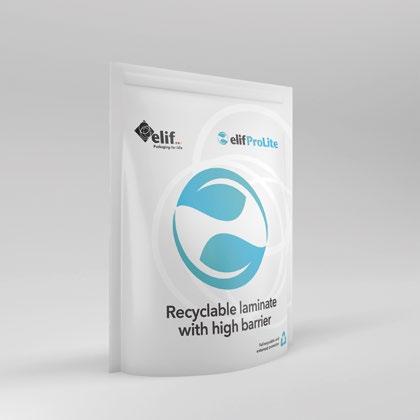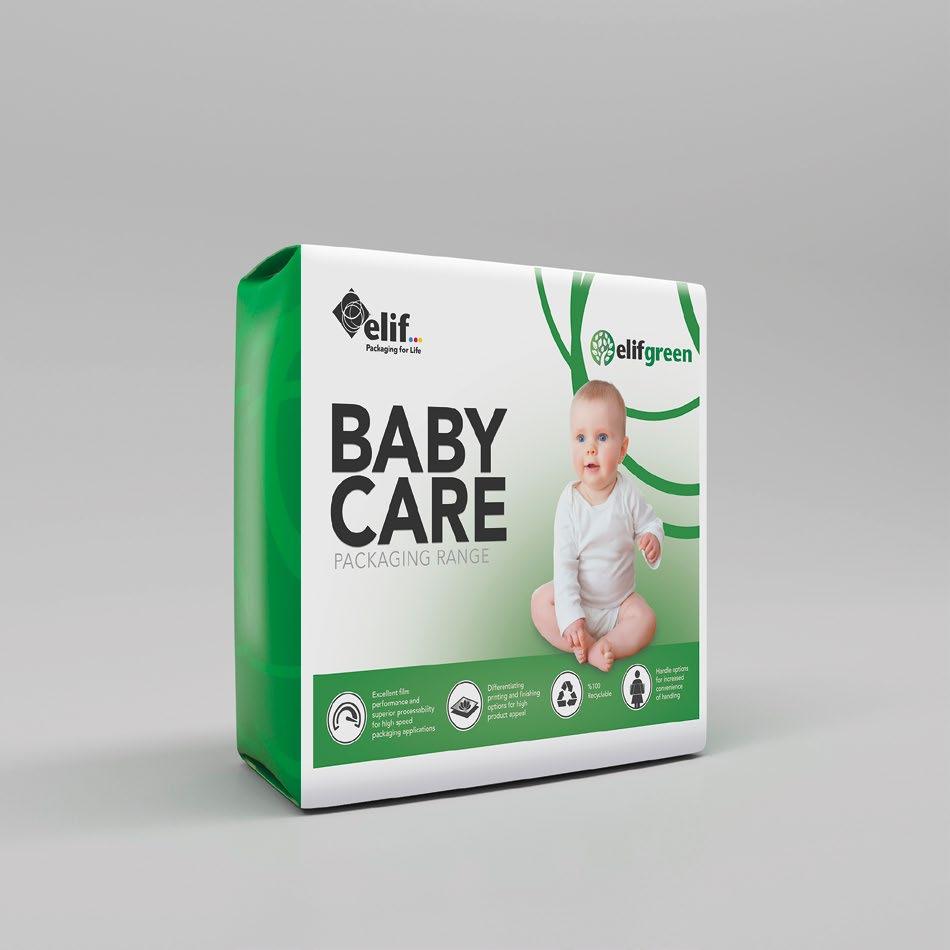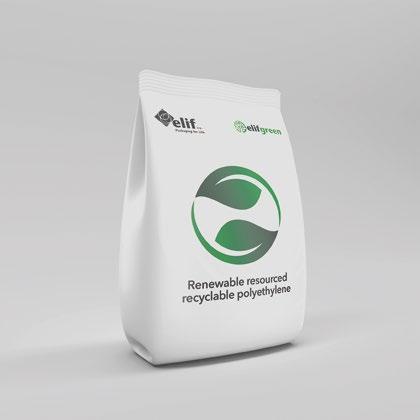
9 minute read
ELIF: ‘SUSTAINABILITY IS PART OF OUR DNA’
ELIF: ‘SUSTAINABILITY IS PART OF OUR DNA’
Elif, a global benchmark company for flexible packaging, explains how the philosophy of ‘Sustainable packaging for life’ encapsulates its belief that producers in this field must innovate to develop the best solutions for everyone around the world to live a healthier and more sustainable life. Victoria Hattersley spoke to Sustainability Director, Dr Betül Türel Erbay.
While many of us have moved into 2021 with a cautious sense of renewed hope following a testing year, the key environmental challenges we face are still looming large as ever. Each year, millions upon millions of tonnes of plastics are leaked into the environment, and according to the Ellen MacArthur Foundation only around 10% of the total produced is recycled. There are no simple answers.
We all know that the packaging industry – and the world into which it feeds – has a huge task to face when it comes to getting on a more sustainable, circular path. Sometimes this task looks insurmountable, because it is so multi-faceted. What does Elif believe are the major challenges to be faced by the flexible packaging sector in particular?
“Packaging is part of the solution to future challenges. However, one of the biggest challenges for sustainability so far is the various processes of collecting and sorting the packaging waste and how to include them in the cycle in order to create a real circular economy,” begins Dr Betül Türel Erbay, Sustainability Director at Elif.
“Successful examples exist, but these are too few and costs are higher. We need waste collection to be easier and cheaper in order to reach wider geographies – and finally, we could then talk about a real circular economy. “On the other hand, the market share of single-use plastics is still high. Therefore, Elif’s aim is also to convert these products into a fully recyclable structure.
As a result, the company tries hard to continuously adapt to changing markets as customers and consumers require even more sustainable solutions. It consequently adapts to stay ahead of trends such as environmental concerns and as well digitalization and demographic shifts.
Elif’s own response to these challenges and more can be summed up in the above-mentioned motto of ‘Sustainable packaging for life’. But what does this mean in real terms? After all, there’s no denying there are a lot of sustainability ‘buzzwords’ flying around: how does this company hope to practically translate its own philosophy into helping the world transition to a circular economy in plastics?
“Smart business fosters sustainability,” says Dr Erbay. “Therefore, we decided to expand our goal to produce continuously ‘Sustainable Packaging for life’, and to offer solutions that always target the ‘best’ for society, the environment, and humanity. Sustainability is part of our DNA. Our packaging reaches millions of people all around the world every day, helping to create a happier and healthier life and, consequently, our business really is ‘Packaging for life’.”
For Elif, this means the confluence of many factors, from increased use of mono-materials to biobased plastics, chemical recycling and – perhaps most importantly – greater cross-industry collaboration. Elif works closely with customers to reach their sustainability goals by using more recycled content, bio-based materials, bio-degradable green PE, and fully recyclable HyPEr/PE laminate structures. Its concrete goal for consumer goods products in Europe, to be achieved by 2025, is to develop packaging that is 100% recyclable, reusable or compostable. Polyolefin-based flexible packaging materials constitute 93% of its product portfolio, which it tells us is already 100% recyclable.
Some of the brands and solutions within Elif’s sustainable product offering for the personal care, food & beverage, pet care and home care sectors include ElifGreen, ElifHybr, ElifNatty and ElifProLite, each addressing a particular challenge or environmental goal. Consequently, Elif recently launched its Elif Sustainable Eco Solutions range. As we go on, we will look more closely at some of these and how they serve as an illustration of the company’s approach in action.
The role of biomaterials
As we have already touched upon, Elif believes strongly in the increased use of bio-based and biodegradable materials as one of the routes to achieving our collective sustainability goals. This can be a challenging subject: many in the industry are still wary of incorporating bioplastics,


possibly due to the cost factors or their perceived lack of recyclability; consumers, meanwhile, do not always understand the difference between terms such as ‘biobased’ or ‘biodegradable’, sometimes leading, unfortunately, to contamination of the recycling chain.
“The cost of biobased products is still higher than the cost of standard products due to the lack of sources,” Dr Erbay concedes. “However, we are convinced that the cost will be more reasonable in the mid-term due to the smart initiatives from the packaging industry. This development will help us to further improve the image of the packaging industry and will be a result of the considerable efforts of companies involved, like ourselves.”
And indeed, examples of these ‘smart initiatives’ she mentions can be glimpsed within Elif’s own brand stable. According to the company’s latest Sustainability Report: ‘ElifGreen is a renewable resource PE flexible packaging film filled with green PE granules made from sugar cane in various percentages up to 100%. It is a 100% recyclable, 100% renewable and 100% sustainable film solution’ that is ‘applicable for all kinds of flexible film packaging products.’
In the area of compostables, Elif’s latest offering is Elif Natty, ‘a compostable PE film formulated with a family of innovative bioplastics alloys based on biodegradable polymers totally or partially obtained from renewable resources’.

The future for recycling technology
Aside from the feedstocks and materials themselves, what about the end of the chain? Nobody in the industry can have failed to miss the high expectations that continue to accumulate around chemical recycling, through which plastics are broken down into their molecular building blocks, potentially opening up new plastics streams which cannot be recycled with current technology. Will it, even, provide the answer to the challenge of achieving food-grade recyclate – an important and oftentimes elusive goal for achieving circularity?
“Yes, definitely,” says Dr Erbay. “Chemical recycling is the preferred option for the time being. Why? The chemical recycling methodology enables us to produce pure materials. This is the best scenario in recycling for food grade with current technologies.”
Given the undeniable prospects for chemical recycling, some would even argue that in the future traditional mechanical recycling technology could be phased out entirely. Others – and Elif is among them – are more pragmatic and feel the reality is more likely to be the use of both approaches. After all, we are still a long way off the industrial reality of chemical recycling and the infrastructure for mechanical is in place throughout the world, ready to be employed. In this case, what is needed is simply a means to produce more high-quality recyclate that can be put through the mechanical process again and again. (I use the word ‘simply’, but naturally we all know that this in itself is anything but.)
An example of a solution developed for circularity using the existing mechanical infrastructure is Elif2Pouch, which is ‘created to meet the growing demand for recyclable packaging... and is in line with the 2030 recyclability target of the EU Commission’. It can be recycled with all other PE materials, including shopping bags, and is ‘compatible with existing post-consumer recycled waste streams’.
“Both [chemical and mechanical] will be used in the near- and mid-term future,” continues Dr Erbay. “Mechanical recycling will ensure the best result, if the source is known and recyclable. Chemical recycling will be a better option if the source has a non-recyclable structure.”


Combining performance and sustainability
We should also remember that sustainability, while it must undoubtedly remain the biggest priority, is not the only one: global demand dictates that it should also combined with ever-higher performance, functionality and – ideally – cost efficiency. Elif’s customer-centricity programme ensures continuous innovation in packaging to deliver product superiority based on enhanced customer and consumer engagement. These are not easy goals to reconcile, as Elif is aware, but it believes the industry must continue to strive for them.
Some recent examples: ElifHybr is a state-of-the-art printing technology that combines both recyclability and the highest quality printing. It uses a combination of different solvent-free ink transfer systems around a CI (central impression) drum together with rapid electron beam (EB) curing and an extended gamut colour system. It is also, says Elif, cost-efficient for short runs – an important consideration as we are of course seeing an increasing appetite for customization.
“ElifHybr enables the pre-printing preparations to be cost efficient for short runs by eliminating the high plate and cylinder costs and also optimises the lost time due to set up by lowering the time spent between two jobs thanks to the robot technology,” explains Dr Erbay.
Efficient barrier performance is also increasingly important for resource efficiency – and Elif believes strongly in the use of monomaterials for these. Elif ProLite is a ‘new high barrier laminated packaging solution’ that is ‘fully recyclable thanks to its monomaterial structure and homogenous composites which are suitable for recycling through the available corresponding recycling streams’. Furthermore, says the company, its ‘high barrier laminate features offer excellent aroma protection and prolonged shelf life’.

Urgent need for global collaboration
One thing I have gleaned from my conversations with Elif is its belief – shared by many others – that one company taking such measures is only part of the solution. A single company, or even one entire segment of an industry cannot tackle the many problems we face. What is needed is cross-collaboration across the entire industry – from producers, to recyclers, to brands owners, even through to consumers themselves.
One of the major challenges identified by Dr Erbay for flexible packaging – a lack of standardized collection processes – is just one case in point: “The appreciated model for the global economy is changing and further developing from a linear into a circular economy. Therefore, the whole supply chain should be aligned with the standardization of recycling processes both nationally and internationally. This is the key success driver to establish an efficiently working global circular economy.”
Elif is playing its part in cross-industry collaboration, as many others are and hopefully many more will follow their example. It recently joined HolyGrail 2.0: this initiative – the overall winner at Packaging Europe’s Sustainability Awards 2019 – was formed to prove the viability of digital watermarking technologies for accurate sorting and therefore higher-quality recycling. It is also a member of various initiatives and associations including Save Food, CEFLEX, UN Global Compact and UNICEF. In addition,
What I personally think resonates in the phrase ‘Sustainable packaging for life’ is the implication that packaging is not just an industry: it forms a part of all our lives and it’s not too dramatic to say that it has the power to shape the lives of future generations for good – or for bad.
And indeed, our current global environmental predicament demands that ‘Sustainable packaging for life’ – in whichever way we choose to understand this – becomes a reality. n










